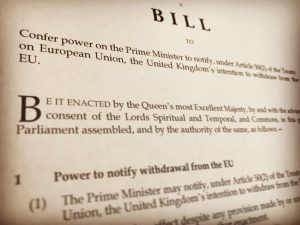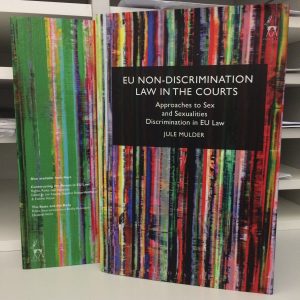By Prof Phil Syrpis, Professor of EU Law (University of Bristol Law School).
 By a majority of 8 to 3, the Supreme Court held that in light of the terms and effect of the European Communities Act 1972, ‘the prerogative could not be invoked by ministers to justify giving Notice under Article 50… Ministers require the authority of primary legislation before they can take that course’ (para. 101). Within hours, the European Union (Notification of Withdrawal) Bill,[1] authorising the Prime Minister to trigger Article 50, was published. It passed through the House of Commons unscathed yesterday. A White Paper, setting out the Government’s plan for Brexit, such as it is, has also been published.[2]
By a majority of 8 to 3, the Supreme Court held that in light of the terms and effect of the European Communities Act 1972, ‘the prerogative could not be invoked by ministers to justify giving Notice under Article 50… Ministers require the authority of primary legislation before they can take that course’ (para. 101). Within hours, the European Union (Notification of Withdrawal) Bill,[1] authorising the Prime Minister to trigger Article 50, was published. It passed through the House of Commons unscathed yesterday. A White Paper, setting out the Government’s plan for Brexit, such as it is, has also been published.[2]
The purpose of this post is very specific. My aim is not to analyse the judgment, the Bill or the White Paper. That has been done elsewhere. Instead, my aim is to begin to explore the relationship between law and politics, and between Parliament, the executive and the judiciary, taking as a starting point the judgments in the Supreme Court. The judges are, at times, careful not to trespass into the political realm. Nevertheless, their findings are informed and influenced, in a number of ways, by the political context. There are, moreover, important differences between the approaches adopted by the majority and the minority, including differences relating to the judges’ understanding of the legal process of Brexit.
It is hoped that inconsistencies between and within the judgments will provoke further academic consideration of the extent to which Courts should intrude into, or take cognisance of, the political realm; and of the extent to which constitutional safeguards are matters of substance or form. But, at this febrile political time, the clearest conclusion is that by failing to answer key questions of law, the Court has done a disservice to Parliament, thereby contributing, not towards the provision of a clear framework within which politicians are able to address the realities of Brexit, but to the pervasive sense of confusion. (more…)










